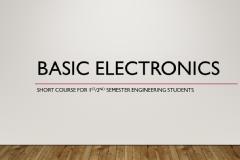Upon completing the Electrical Circuits course, students will:
- Master the fundamentals of circuit analysis, including Ohm’s Law, Kirchhoff’s Laws, and network theorems.
- Analyze and solve both DC and AC circuits involving resistors, capacitors, inductors, and power sources.
- Apply techniques like mesh and nodal analysis, superposition, Thevenin’s and Norton’s theorems.
- Gain hands-on experience with circuit simulation tools and lab experiments to verify theoretical calculations.
- Develop problem-solving skills for real-world circuit design and troubleshooting.
- Be prepared to tackle advanced electrical circuits concepts and applications in their academic and professional journey.
- Master transient analysis for RC, RL, and RLC circuits, understanding time constants and behavior during switching conditions.
- Analyze two-port networks, including parameters like Z, Y, h, and ABCD, and apply them to real-world network analysis.
- Perform practical circuit simulations and experiments to observe transient responses and validate two-port network behavior.
This version emphasizes transient analysis and two-port networks as key skills alongside core circuit concepts





